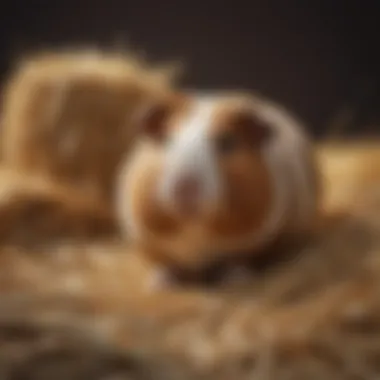Understanding Guinea Pig Dietary Requirements for Health


Intro
Guinea pigs are cherished pets that require proper care and nutrition. Understanding their specific needs goes beyond just feeding them now and then. Ensuring their well-being involves recognizing their dietary requirements, habits, and unique characteristics. This article aims to provide comprehensive insights into what constitutes a balanced diet for guinea pigs, including the types of food they should consume and common misconceptions surrounding their nutrition. As a responsible pet owner, being informed about these aspects is key to ensuring your pet thrives.
Understanding Your Pet
Pet Behavior Basics
Guinea pigs are social animals that thrive on companionship. Their behavior reflects their feelings and needs. They communicate through various vocalizations, such as squeaks and purrs, indicating excitement or contentment. Taking note of these sounds can help you understand their mood. Additionally, guinea pigs enjoy exploring their surroundings and may display inquisitive behavior, especially when introduced to new environments or objects.
Common Breed Characteristics
Different breeds of guinea pigs exhibit various characteristics that can influence dietary needs and care. For instance, some breeds are larger and may require more food, while others may have specific grooming needs due to thicker fur. Popular breeds like the American, Abyssinian, and Peruvian guinea pig each have unique traits. Understanding your pet's breed can enhance compatibility with dietary choices and care practices.
Species-Specific Needs
Guinea pigs are herbivores and have a unique digestive system that necessitates a high-fiber diet. Unlike other small pets, they cannot synthesize Vitamin C and must obtain it from their diet. This necessity highlights the importance of providing a varied selection of foods that meet their specific nutritional requirements. Failing to do so can lead to health problems over time.
Pet Care and Maintenance
Feeding Guidelines
Creating a proper feeding regimen is essential. Guinea pigs thrive on a diet primarily made up of hay, fresh vegetables, and specially formulated pellets. Timothy hay is a popular choice due to its high fiber content, promoting digestive health. In addition to hay, fresh vegetables like bell peppers, kale, and cucumbers offer essential vitamins. It is crucial to avoid feeding them iceberg lettuce, which has little nutritious value.
Grooming Essentials
Though guinea pigs are relatively low-maintenance, regular grooming is necessary, especially for long-haired breeds. Brushing helps prevent matting and reduces shedding. It's also a good opportunity to check for any skin issues or signs of discomfort that may require veterinary attention. Regular nail trimming is another aspect of their grooming that should not be overlooked, as overgrown nails can be painful for the animal.
Hygiene Practices
Maintaining a clean habitat is vital for your guinea pig’s health. Their living area should be cleaned frequently to prevent the buildup of waste and odors. Fresh bedding needs to be provided regularly to enhance comfort and minimize health risks. Proper hygiene practices will contribute to both physical and mental well-being for your pet.
Health and Wellness
Routine Vet Check-ups
Routine veterinary check-ups are essential to ensure your guinea pig remains healthy. Regular visits can help identify potential health issues early, which is crucial for effective treatment. A veterinarian experienced with exotic pets is ideal for providing specialized care.
Vaccination Needs
While guinea pigs do not usually require vaccinations like dogs or cats, they should be regularly examined for any signs of diseases. Professional guidance can help determine the necessary preventive measures based on specific risks in your area.
Recognizing Signs of Illness
Being aware of the signs of illness is crucial for any pet owner. Common signs may include changes in appetite, lethargy, or unusual vocalizations. Early detection can significantly improve health outcomes, allowing for timely medical intervention.
Enrichment and Activities
Indoor vs.
Outdoor Activities
Guinea pigs require both mental and physical stimulation. Indoor activities can include exploring tunnels or climbing on specially designed structures. Outdoor play, under supervision, allows them to engage with grass and other natural elements. Both environments should offer opportunities for them to express their natural behaviors.
Interactive Toys and Games
Offering interactive toys can keep your guinea pig engaged. Simple toys made of untreated wood or cardboard can encourage chewing, which is essential for their dental health. Puzzle feeders can also provide mental challenges that stimulate their curiosity.
Socialization Opportunities
Guinea pigs are social creatures that should not be kept alone. Providing companionship, whether it's another guinea pig or regular interaction with humans, is crucial for reducing stress and preventing loneliness. Creating a social environment fosters happiness and encourages healthy behavior.
A well-rounded understanding of guinea pigs' dietary needs is fundamental to their happiness and well-being. Proper care, attention, and a good diet pave the way for a healthy, long life.
Prolusion to Guinea Pig Nutrition


Guinea pigs are herbivores, which means their diet should primarily consist of plant-based foods. This diet should be rich in fiber, which is essential for maintaining a healthy digestive system. Providing the right balance of nutrients is not just beneficial but necessary; without it, guinea pigs can face serious health issues, including obesity, malnutrition, and digestive disorders.
The Unique Digestive System of Guinea Pigs
The digestive system of a guinea pig is distinct and adapted to process high-fiber foods. Their gastrointestinal tract is relatively simple but highly specialized. Unlike some animals, guinea pigs cannot produce certain vitamins on their own, particularly vitamin C, making it essential to include this in their diet through fresh vegetables or supplements.
One of the key features of their digestive tract is a large cecum, where fermentation of fibrous materials takes place. This unique adaptation allows guinea pigs to efficiently break down tough plant fibers. Therefore, including an adequate amount of hay, which provides both fiber and essential nutrients, is vital.
Understanding Nutritional Needs
To fully grasp the dietary requirements of guinea pigs, one must recognize the importance of different food components. Their diet must consist of a foundational element, such as hay, complemented by an appropriate selection of pellets and fresh vegetables. Beyond fiber, guinea pigs require a mix of vitamins and minerals to thrive.
It’s important to note that the nutritional needs of guinea pigs can vary based on their age, health status, and level of activity. Young guinea pigs, for instance, have different caloric and nutritional needs compared to older guinea pigs.
Focusing on quality rather than quantity is crucial. Some common mistakes include feeding too many treats or relying on inadequate pellet mixes that lack the necessary components. Thus, understanding the intricacies of guinea pig nutrition is a necessary first step for any pet owner hoping to provide a healthy environment for their furry companions.
Essential Food Components
Hay: The Cornerstone of Their Diet
Hay serves as the fundamental dietary component for guinea pigs. It is the primary source of fiber, which is crucial for their digestive health. Without adequate fiber, guinea pigs can experience serious health issues such as gastrointestinal stasis.
Types of Hay
There are several types of hay available for guinea pigs, with the most common being timothy hay, orchard grass, and meadow hay. Each hay type has unique characteristics that make it beneficial. Timothy hay is particularly favored due to its high fiber content and variety of nutrients. Orchard grass offers a sweeter taste, while meadow hay provides a mix of grass and plants. The availability of these options allows guinea pig owners to cater to their pets’ preferences.
Benefits of Timothy Hay
Timothy hay is recognized as an excellent choice for guinea pigs because it promotes dental health. The rough texture helps wear down their continuously growing teeth. Furthermore, it aids in digestion and helps to prevent obesity. Guinea pigs naturally seek out hay, making it a preferred food that encourages foraging behavior, a vital part of their daily activity.
How Much Hay Is Needed
Guinea pigs should have unlimited access to hay throughout their day. This means that a constant supply is crucial for avoiding digestive issues. Generally, it is recommended to provide a minimum of one cup of hay per guinea pig per day, although more is better. By ensuring a consistent supply, owners can help their guinea pigs maintain a healthy diet.
Pellets: A Supplementary Source of Nutrition
While hay is the mainstay, pellets offer a supplementary source of nutrition. They are designed to provide additional vitamins and minerals that might be lacking from hay alone. However, it's essential to choose the right kind to ensure they are beneficial to your pet's health.
Choosing the Right Pellets
Selecting high-quality pellets is paramount. Look for those that are specifically formulated for guinea pigs and that contain uniform pieces. Pellets should primarily consist of grass hay, avoiding those high in seeds or treats. A good choice ensures that they receive the required nutrients without unnecessary additives or excess sugars.
Avoiding Seed-Based Pellets
It is important to avoid seed-based pellets. These often contain ingredients that are not suitable for guinea pigs, such as too much fat or sugar, leading to obesity and other health issues. Stick to hay-based varieties to ensure your guinea pig receives balanced nutrition without extra calories that may harm their health.
Feeding Guidelines for Pellets
Pellet feeding should be controlled. A general guideline is to offer about 1/8 to 1/4 cup of pellets per guinea pig daily. Adjustments may be necessary depending on the activity level and health of your pet. Monitoring their weight is helpful in determining the right amount, adjusting as needed, and ensuring they maintain healthy body weight.
Fresh Vegetables: Adding Variety
Incorporating fresh vegetables into their diet adds necessary variety and can enhance their overall nutrient intake. Vegetables can provide important vitamins and minerals, enriching their daily meal and satisfying their need for diverse tastes and textures.
Safe Vegetables for Guinea Pigs
Certain vegetables are safe for guinea pigs, such as bell peppers, cucumbers, and leafy greens like kale and romaine lettuce. Good choices provide essential vitamins such as Vitamin C and fiber. However, avoid starchy veggies like potatoes and corn, which can lead to digestive issues.
Daily Serving Sizes
Fresh vegetables should be offered in moderation. Daily serving sizes should range from one cup of chopped veggies per guinea pig, adjusting based on the variety and individual pet preferences. Providing a rotation of different vegetables can keep their meals interesting and attribute to balanced nutrition.
Potential Risks of Overfeeding
Overfeeding vegetables can lead to gastrointestinal upset. It's crucial to introduce new vegetables slowly and observe for any adverse reactions. Keeping a balance is key; too many fresh veggies can interrupt the healthy balance of fiber from hay and pellets.
Balanced nutrition is the cornerstone to keeping your guinea pigs healthy and happy.


Fruits and Treats
Fruits and treats can play an important role in the diet of guinea pigs. These items add variety and make feeding time more enjoyable for these small animals. Understanding the specifics of fruits and treats can help pet owners provide a balanced and appealing diet that meets the nutritional needs of their pets. Care must be taken to choose appropriate items, as some fruits can be too sugary or high in calories. This article discusses safe options, feeding guidelines, and the best practices for treats, ensuring guinea pigs remain healthy.
Nutritional Value of Fruits
Safe Fruits for Guinea Pigs
Fruits can provide essential vitamins and minerals for guinea pigs. However, not all fruits are safe. Common safe fruits include apples, strawberries, and blueberries. These fruits are low in sugar compared to others, making them a wise choice. They are also high in Vitamin C, which is crucial for the overall well-being of guinea pigs. Being high in fiber, these fruits assist in maintaining a healthy gastrointestinal system as well.
**Key Characteristics:
- Freshness is important for safe fruits. Many fruits provide hydration as well which is good for ur health. Just remember to wash them to remove any pesticides.**
Feeding Guidelines for Fruits
Feeding guidelines for fruits focus on moderation. Guinea pigs should receive fruits only in small amounts, about 1 tablespoon per day. This amount can prevent digestive issues and obesity. Mixing different fruits in small portions can also help provide variety. Using fruits as a primer or a reward can also help bond with the pet.
**Unique Features:
- Keep in mind to introduce new fruits slowly to gauge their reaction. Monitor for any signs of diarrhea or upset stomach when trying new items.**
Frequency of Treats
When it comes to treats, less is more. Treats should be given once or twice a week. Overindulgence can lead to obesity and related health problems. It's vital to view treats as a supplement to their primary diet. Secure and healthy relationships can be built by sharing safe treats.
**Key Characteristics:
- Petite portions can enhance the treat experience without risking their health. Schedule treats for days when they seem active and playful for better interaction.**
Commercial Treats: Pros and Cons
Understanding Ingredients
Commercial treats for guinea pigs can be convenient, but understanding their ingredients is key. Many products contain fillers, sugar, or artificial components that do not benefit guinea pigs.
**Key Characteristics:
- Always check the label before purchasing. Choosing organic options can reduce the risk of harmful additives.**
Identifying Healthy Options
Identifying healthy options within commercial treats helps ensure that guinea pigs receive the best nutrition. Look for treats made primarily from hay or natural fruits without added sugars.
**Unique Features:
- Even within commercial products, there's a wide span of quality. Opting for reputable brands can promote better animal health.**
Homemade Treats Ideas
Making homemade treats can also be a fun and healthy alternative. Simple recipes using oats, fruits, and veggies can be beneficial. Crafting treats allows control over the ingredients and ensures they are safe and nutritious.
**Key Characteristics:
- Experimenting with different shapes and presentations can make treat time exciting. Incorporating herbs for flavor can add to the experience too.**
Always remember to conduct research before introducing any new foods to your guinea pig's diet. Their health depends on mindful choices.
Hydration Needs
Importance of Water Intake
Hydration is critical for guinea pigs. These animals require a constant supply of fresh water to maintain their health. Water plays a vital role in digestion, nutrient absorption, and even temperature regulation. Dehydration can lead to severe health issues, such as kidney problems and urinary tract infections. Therefore, it is essential to ensure that guinea pigs have access to clean water at all times. It is also important to monitor their water intake, as changes in drinking habits can indicate underlying health concerns.
Providing Clean Water


Choosing Bowls vs.
Bottles
When it comes to providing water, owners often face the decision between using bowls or bottles. Each method has its distinct advantages and disadvantages. Bowls can be easier for guinea pigs to access. They allow the animals to drink as much as they want without limitations. However, bowls require more frequent cleaning. They can easily become dirty or contaminated with food or bedding materials.
On the other hand, water bottles are less prone to contamination. They tend to stay cleaner than bowls, as they are usually designed to prevent spillage. Bottles can also help keep the water from becoming stale, which is a common issue with open bowls. The main drawback is that some guinea pigs may not readily understand how to use them. As a result, it might take time to train them to drink from a bottle. Ultimately, the choice between bowls and bottles comes down to the individual pet's behavior and the owner’s routine.
Preventing Contamination and Stagnation
Maintaining water cleanliness is essential for the health of guinea pigs. Contaminated water can pose significant health risks. Various bacteria can thrive in stagnant water, leading to gastrointestinal issues. To avoid these problems, regularly replace the water and clean the dish or bottle.
To prevent contamination, ensure that no bedding or food falls into the water container. If using a bowl, consider placing it on a clean surface that is easy to maintain. For bottles, check the spout regularly for blockages or leaks. Taking these precautions helps ensure that your guinea pig has a constant supply of fresh, safe water. Monitoring your pet’s drinking habits and staying attentive to their hydration is key to their overall well-being.
Common Dietary Mistakes
Understanding common dietary mistakes is essential for any guinea pig owner. These creatures have specific nutritional requirements, and missteps in their feeding can lead to significant health issues. Awareness of these mistakes helps in providing a balanced diet, ensuring long-term health and well-being.
Overfeeding and Its Consequences
Guinea pigs have a tendency to eat a lot, but this does not mean they should be overfed. Overfeeding can lead to obesity, which poses various health risks such as diabetes and heart diseases. Portion control is crucial. A guideline is to provide fresh hay and vegetables, but monitor their total food intake closely.
Remember: Guinea pigs should not have unlimited access to pellets as these can be calorie-dense.
It is important to determine the correct serving sizes based on the guinea pig’s age, weight, and activity level. Maintaining a balanced diet is better than simply increasing quantity.
Underestimating Vitamin Needs
Vitamin C is a vital nutrient for guinea pigs, as they cannot synthesize it on their own. Lack of this vitamin can lead to scurvy, causing serious health issues like joint pain and lethargy. It is advisable to incorporate vitamin C-rich vegetables like bell peppers or green leafy vegetables into their diet. For many owners, vitamin supplements may also be necessary, especially if the regular diet does not cover their needs. Each guinea pig should receive about 10-30 mg of Vitamin C per day.
Neglecting Low-Fiber Diets
Fiber is a key component of a guinea pig's diet. Low-fiber diets can cause serious digestive problems, including stasis. Guinea pigs require a minimum of 80% hay in their daily diet. Different types of hay offer varying fiber types, but Timothy hay is highly recommended for its high fiber content. Ensuring a consistent supply of hay can mitigate potential gastrointestinal issues. Fresh vegetables and limited pellets should complement the hay, but never replace it.
Knowledge about these common dietary mistakes will safeguard your guinea pig’s health. Careful attention to their nutritional needs will lead to a happier and healthier pet.
Monitoring Health Through Diet
Understanding how to monitor the health of your guinea pig through their diet is crucial. Their well-being relies on a balanced intake of nutrients, and any deficiencies or excesses can lead to serious health issues. A careful observation of their eating habits and health indicators helps in making informed dietary adjustments.
Signs of Nutritional Deficiencies
Nutritional deficiencies can manifest in various ways. Owners should actively look for these signs to take timely action. Some common indicators include:
- Weight Loss: A noticeable decrease in body weight often suggests a lack of essential nutrients.
- Poor Coat Condition: Dry or unhealthy fur might signal a need for increased fatty acids or other nutrients.
- Lethargy: A drop in energy levels can be linked to inadequate nutrition.
- Dental Issues: Overgrown teeth can arise from insufficient fiber in their diet, causing difficulties in eating.
- Digestive Problems: This may include diarrhea or bloating, often resulting from poor dietary choices.
By being vigilant about these signs, pet owners can ensure they are meeting their guinea pig's nutritional needs effectively.
Weight Management and Dietary Changes
Weight management is a vital aspect of any pet's diet, including guinea pigs. Maintaining an optimal weight is essential for their overall health. Overweight guinea pigs are at risk for serious health problems, such as heart disease and diabetes.
To manage their weight:
- Measure Food Portions: Regularly check how much food is given.
- Monitor Treat Intake: Treats should be limited to avoid excess calories.
- Incorporate Variety in Diet: A mix of hays, pellets, and vegetables can help maintain interest in food and nutritional balance.
- Adjust Based on Activity Levels: More active guinea pigs may require slightly more food than those that are less active.
If a dietary change is needed due to weight issues or health concerns, it should be done gradually. Sudden alterations can confuse their digestive system. Always consult with a veterinarian before making significant changes.
Remember: Regular weigh-ins and observations can help avert potential health issues, ensuring that your guinea pig leads a healthy life.
End
Summary of Key Points
- Guinea pigs require a diet rich in hay, vegetables, and appropriate pellets. Each of these components offers necessary nutrients that are crucial for their health.
- Water intake should not be neglected. Offering clean and fresh water is vital for hydration.
- Common dietary mistakes, such as overfeeding and neglecting vitamin C, can lead to severe health issues. It is important to be vigilant about their nutritional necessities.
- Monitoring signs of nutritional deficiencies can help in making timely adjustments to their diet and safeguard their health.
Encouraging Informed Choices
Parents and pet owners must be educated about the dietary needs of guinea pigs. This knowledge allows for better decision-making regarding their food choices.
When selecting pellets or treats, it is advisable to check ingredients carefully. Avoid any options that contain seeds or are excessively sugary. Instead, look for products formulated specifically for guinea pigs that meet their unique nutritional requirements.
Providing variety in vegetables while ensuring proper serving sizes can keep guinea pigs healthy and happy. Moreover, introducing treats gradually can prevent health issues. Encouraging healthy eating habits involves understanding their physiology and requirements, ultimately contributing to a thriving pet.







